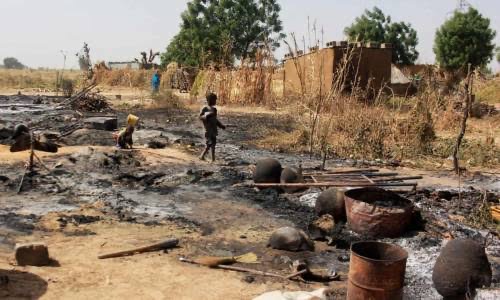The United Nations Development Programme (UNDP) yesterday put the death toll from the ongoing conflict with terrorists in the North-east at about 350,000 people as of the end of 2020.
It, however, projected that should the insurgency continue till 2030, the fatalities could rise to over 1.1 million.
According to a UNDP’s report on the impact of the insurgency in the North-east region presented yesterday at a virtual meeting by the Country Director, Mr. Mohammed Yahaya, at least 35,000 people have so far been killed directly by the insurgents, with 350,000 said to have died indirectly as a result of the crisis.
On the socioeconomic impact of the crisis on states in the region, the report said $27.8 billion had been lost in GDP, plunging at least 1.4 million people into poverty.
The report showed that at least 1.8 million children in the North-east are not enrolled in schools as a result of the conflict.
The UNDP said: “The full human cost of the war is much greater.
“Already, many more have died from the indirect effects of the conflict.”
It cited damage to agriculture, water, trade, food and healthcare.
Children younger than five accounts for more than nine out of 10 of those killed, with 170 dying every day, the UNDP added.
If the conflict continues to 2030, more than 1.1 million people may die, the agency stated.
“Destruction and displacement have set back development in the region by decades, and continued conflict will only further scar the region,” the UNDP said.
The report said since 2009, the devastating conflict in the North-eastern Nigeria has directly resulted in the deaths of approximately 35,000 people as a consequence of insurgency.
The report warned that indirect deaths, including disease and hunger resulting from the conflict’s physical and economic destruction, already far outnumber those from direct causes.
The report: ‘Assessing the Impact of Conflict on Development in North-east Nigeria’ added that critical aspects of progress and development, including GDP, poverty, malnutrition, infant mortality, education, water availability and sanitation, may not return to pre-conflict levels even by 2030.
UNDP stated that more than 90 per cent of conflict-attributable deaths are of children under the age of five.
The report said physical and economic destruction wrought by the insurgency had dismantled already fragile health and food systems.
According to it, less than 60 per cent of health facilities in Adamawa, Borno, and Yobe States are fully functional, while a quarter are either completely destroyed or non-functional.
The report also lamented that attacks from insurgency have also led to massive internal displacement, with more than 1.8 million Nigerians displaced in Adamawa, Borno, and Yobe States, while the vast majority (nearly 1.5 million) are located in Borno.
The study also showed that in addition, 1.8 million students were out of school in 2020, and without increased investment in development efforts, the average Nigerian in the North-east would have lost a full year of education by 2030.
The statement, however, acknowledged that Nigeria has made great strides in retaking and stabilising large areas of the region, stressing that continued investment in development from both national and international stakeholders is needed.
“Without continued investment in development as a long-term solution, the protracted conflict in north-east Nigeria will continue to impact other parts of the country and the entire Sahel region.
“There is a need for international partners and national stakeholders to ensure that funds are invested not only on life-saving and humanitarian needs but also on mid-and long-term development priorities in order to enable Nigeria to achieve the SDGs and attain the AU 2063,” the report quoted UNDP Resident Representative, Yahaya, as saying.
The report noted that to overcome the conflict, development efforts need to be focused on the stabilisation of affected areas through a community-level approach that enhances physical security and access to justice, rehabilitation of essential infrastructure and basic service delivery as well as the revitalisation of the local economy such as market stalls, schools and police stations.

